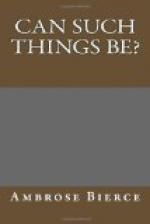“I cried aloud!—the spell, unbroken
still,
Rested upon my spirit and my will.
Unsouled, unhearted, hopeless and
forlorn,
I strove with monstrous presages of ill!
“At last the viewless—”
Holker ceased reading; there was no more to read. The manuscript broke off in the middle of a line.
“That sounds like Bayne,” said Jaralson, who was something of a scholar in his way. He had abated his vigilance and stood looking down at the body.
“Who’s Bayne?” Holker asked rather incuriously.
“Myron Bayne, a chap who flourished in the early years of the nation--more than a century ago. Wrote mighty dismal stuff; I have his collected works. That poem is not among them, but it must have been omitted by mistake.”
“It is cold,” said Holker; “let us leave here; we must have up the coroner from Napa.”
Jaralson said nothing, but made a movement in compliance. Passing the end of the slight elevation of earth upon which the dead man’s head and shoulders lay, his foot struck some hard substance under the rotting forest leaves, and he took the trouble to kick it into view. It was a fallen headboard, and painted on it were the hardly decipherable words, “Catharine Larue.”
“Larue, Larue!” exclaimed Holker, with sudden animation. “Why, that is the real name of Branscom—not Pardee. And—bless my soul! how it all comes to me—the murdered woman’s name had been Frayser!”
“There is some rascally mystery here,” said Detective Jaralson. “I hate anything of that kind.”
There came to them out of the fog—seemingly from a great distance— the sound of a laugh, a low, deliberate, soulless laugh, which had no more of joy than that of a hyena night-prowling in the desert; a laugh that rose by slow gradation, louder and louder, clearer, more distinct and terrible, until it seemed barely outside the narrow circle of their vision; a laugh so unnatural, so unhuman, so devilish, that it filled those hardy man-hunters with a sense of dread unspeakable! They did not move their weapons nor think of them; the menace of that horrible sound was not of the kind to be met with arms. As it had grown out of silence, so now it died away; from a culminating shout which had seemed almost in their ears, it drew itself away into the distance, until its failing notes, joyless and mechanical to the last, sank to silence at a measureless remove.
THE SECRET OF MACARGER’S GULCH
North Westwardly from Indian Hill, about nine miles as the crow flies, is Macarger’s Gulch. It is not much of a gulch—a mere depression between two wooded ridges of inconsiderable height. From its mouth up to its head—for gulches, like rivers, have an anatomy of their own—the distance does not exceed two miles, and the width at bottom is at only one place more than a dozen yards; for most of the distance on either side of the little




